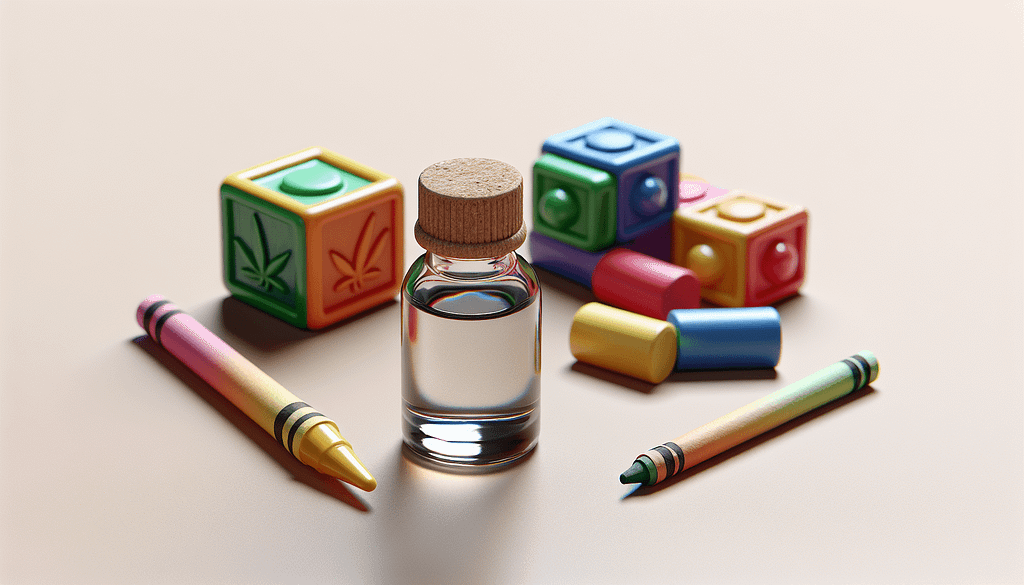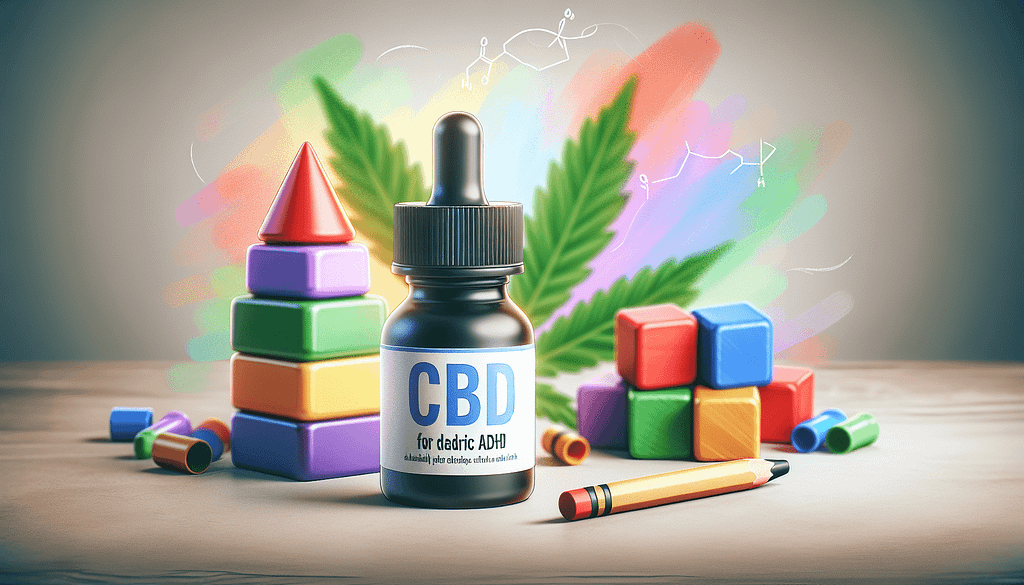As an Amazon Associate I earn from qualifying purchases.
Explore the benefits and dosage guidelines of using CBD for managing ADHD symptoms in children. Learn how CBD can help with focus, hyperactivity, and sleep.
CBD Dosage and Effects on ADHD in Children

Introduction to CBD and ADHD
Attention-Deficit/Hyperactivity Disorder (ADHD) is a common neurodevelopmental disorder that affects many children worldwide. Children with ADHD often exhibit patterns of inattention, hyperactivity, and impulsivity that are beyond the typical behaviors for their age group. Living with ADHD can be challenging for both the affected children and their families. Recently, Cannabidiol, or CBD, has emerged as a potential alternative treatment option for managing ADHD symptoms in children. In this article, we’ll explore how CBD might help with ADHD and how to approach finding the appropriate dosage for children.
Understanding ADHD
What is ADHD?
ADHD, or Attention-Deficit/Hyperactivity Disorder, is a chronic condition characterized by persistent issues with attention, hyperactivity, and impulsive behavior. It often starts in childhood and can continue into adulthood. Children with ADHD might struggle to pay attention, control impulsive behaviors, or be overly active.
Signs and Symptoms of ADHD
Symptoms of ADHD generally fall into two main categories: inattention and hyperactivity/impulsivity. Some common signs include:
- Difficulty sustaining attention in tasks or play activities
- Frequent mistakes due to inattention to detail
- Trouble organizing tasks and activities
- Excessive talking and interrupting others
- Difficulty waiting for their turn
It’s important to note that many children exhibit these behaviors at times, but kids with ADHD display these behaviors more frequently and severely.
Introduction to CBD
What is CBD?
Cannabidiol (CBD) is one of over 100 chemical compounds found in the cannabis plant. Unlike THC, the psychoactive component of cannabis, CBD does not produce a “high.” CBD is primarily extracted from hemp plants and is used for its potential therapeutic effects.
How Does CBD Work?
CBD interacts with the body’s endocannabinoid system (ECS), which plays a crucial role in regulating various physiological processes such as mood, pain sensation, and immune response. By influencing the ECS, CBD may help to maintain balance and promote overall wellness.
Is CBD Safe for Children?
While CBD is generally considered safe for adults, there are ongoing discussions and research about its safety and efficacy in children. Early research and anecdotal reports suggest that CBD might be beneficial for various conditions, but it’s crucial to approach CBD use for children cautiously and under professional guidance.
CBD and ADHD: Potential Benefits
How CBD May Help Manage ADHD Symptoms
Researchers believe that CBD might help manage ADHD symptoms through its interactions with the endocannabinoid system. The potential benefits include:
- Enhancing Focus: Some studies suggest that CBD can help improve attention and focus, potentially benefiting kids who struggle with inattention.
- Calming Hyperactivity: CBD might have calming effects, which could help reduce hyperactive behaviors in children with ADHD.
- Improving Sleep: Sleep issues are common among children with ADHD, and CBD is known for its potential to improve sleep quality and duration.
Research on CBD and ADHD
While research on CBD and ADHD is still in its early stages, some studies and anecdotal evidence highlight promising results. For example, a 2016 study published in European Neuropsychopharmacology found that individuals with ADHD who used cannabis experienced a reduction in hyperactivity and impulsivity. However, more comprehensive studies are needed to confirm these findings and understand the long-term effects.

Finding the Right CBD Dosage for Children
Consult a Healthcare Professional
Before starting any CBD regimen for your child, it’s imperative to consult with a healthcare professional, particularly one experienced with CBD and its use in pediatric care. They can provide personalized advice based on your child’s specific needs and medical history.
Start Low and Go Slow
A common approach to finding the right CBD dosage is to “start low and go slow.” Begin with a low dose and gradually increase it while monitoring your child’s response. This method helps to minimize potential side effects and find the most effective dose.
General Dosage Guidelines
There are no official dosage recommendations for CBD, and the right dosage can vary widely based on factors such as weight, age, and the severity of symptoms. Here are some general guidelines:
- Low Dose: 0.5 mg of CBD per kilogram of body weight per day
- Medium Dose: 1 mg of CBD per kilogram of body weight per day
- High Dose: 1.5 mg of CBD per kilogram of body weight per day
Again, these are starting points, and adjustments should be made based on your child’s response and under professional guidance.
Monitoring and Adjusting Dosage
After starting a CBD regimen, closely monitor your child’s behavior and any changes in their symptoms. Keep a journal to track dosage amounts, times, and any observed effects. This diary can be invaluable when discussing progress with your healthcare professional and making any necessary adjustments.
Choosing the Right CBD Product
The market offers a variety of CBD products, including oils, gummies, and capsules. When selecting a product for your child, consider the following:
- Quality and Purity: Opt for products that have been third-party tested for quality and purity.
- Type of CBD: Full-spectrum, broad-spectrum, and isolate CBD are available. Full-spectrum contains all cannabinoids, including slight traces of THC, while broad-spectrum removes THC entirely. Isolate is pure CBD.
- Dosage Form: Consider which form might be easiest for your child to take. Oils and tinctures allow for precise dosing, while gummies might be more palatable but less precise.
Potential Side Effects and Precautions
Common Side Effects
While CBD is generally well-tolerated, some children might experience side effects such as:
- Drowsiness
- Gastrointestinal issues
- Changes in appetite
- Dry mouth
These side effects are generally mild and temporary. Nonetheless, consult a healthcare provider if any adverse effects occur.
Precautions and Interactions
CBD can interact with other medications, mimicking or inhibiting their effects. If your child is already on medication for ADHD or any other condition, it’s vital to consult with a healthcare professional before starting CBD to discuss potential interactions.
Considerations for Long-Term Use
Is Long-Term Use Safe?
Long-term studies on the effects of CBD in children are still lacking. While current research suggests that CBD may offer benefits for managing ADHD symptoms, long-term safety data remains an important area for ongoing research.
Periodic Re-Evaluation
If your child is using CBD for a prolonged period, it’s advisable to have regular check-ups with your healthcare provider. These visits should include discussions on the effectiveness, any side effects, and whether any adjustments in dosage or product type are necessary.
Other Natural Alternatives for ADHD
Diet and Nutrition
A balanced diet rich in whole foods can have a positive impact on ADHD symptoms. Foods rich in omega-3 fatty acids, such as fish, flaxseeds, and walnuts, have been shown to support brain health.
Physical Activity
Exercise can significantly reduce symptoms of ADHD. Regular physical activity helps improve attention, reduces hyperactive and impulsive behaviors, and has various other health benefits.
Behavioral Therapy
Behavioral therapy involves working with a therapist to develop strategies for managing and modifying unwanted behaviors. This approach is often effective for children with ADHD and can be used alongside other treatments.
Mindfulness and Relaxation Techniques
Practicing mindfulness and relaxation techniques, such as yoga and meditation, can help children with ADHD manage stress and improve focus.
When to Seek Medical Attention
Signs That Require Immediate Attention
While many children with ADHD can be managed with a combination of treatments, it’s crucial to seek medical attention if:
- Your child is experiencing severe side effects from any treatment, including CBD.
- Symptoms of ADHD are significantly worsening.
- Your child is having difficulty functioning at home or school despite treatment.
Consulting a healthcare professional ensures that your child receives the best possible care and treatment plan.
Real-Life Experiences
Testimonials from Parents
Hearing from other parents who have tried CBD for their children’s ADHD can provide valuable insights. Some parents report significant improvements in attention, behavior, and overall quality of life after introducing CBD. However, experiences can vary, emphasizing the importance of individualized care and professional guidance.
Success Stories
Take, for example, Sarah, a mother of an 8-year-old boy named Alex diagnosed with ADHD. After struggling with traditional medications and their side effects, Sarah consulted a pediatrician knowledgeable about CBD. They started Alex on a low dose of CBD oil, gradually increasing it over weeks. Today, Sarah reports that Alex’s focus has improved, he’s less hyperactive, and his sleep has normalized, significantly enhancing his daily life.
Frequently Asked Questions
Can CBD Cure ADHD?
While CBD may help manage symptoms, it is not a cure for ADHD. ADHD is a chronic condition, and CBD should be considered as one part of a comprehensive treatment plan.
Is CBD Legal for Children?
The legality of CBD varies by country and state. In many regions, CBD derived from hemp with less than 0.3% THC is legal, but it’s essential to check local regulations and consult with a healthcare provider.
What Should I Look for in a CBD Product?
Look for third-party tested products for purity and safety, choose products with clear dosing instructions, and opt for a delivery method that suits your child’s needs and preferences.
Final Thoughts
CBD holds promise as a potential management tool for children with ADHD, offering hope to families seeking alternative treatment options. While more research is needed to fully understand its efficacy and long-term safety, early evidence and anecdotal reports are encouraging. Always consult with a healthcare professional before starting any new treatment, and approach CBD use with careful consideration and monitoring.
If you found this article helpful, please clap to show your appreciation, leave a comment below, and subscribe to our Medium newsletter for regular updates. Your support helps us continue to provide valuable information and resources. Thank you for reading!
Disclosure: This story incorporates AI assistance for content creation.
Disclosure: As an Amazon Associate, I earn from qualifying purchases.
Amazon and the Amazon logo are trademarks of Amazon.com, Inc, or its affiliates.
